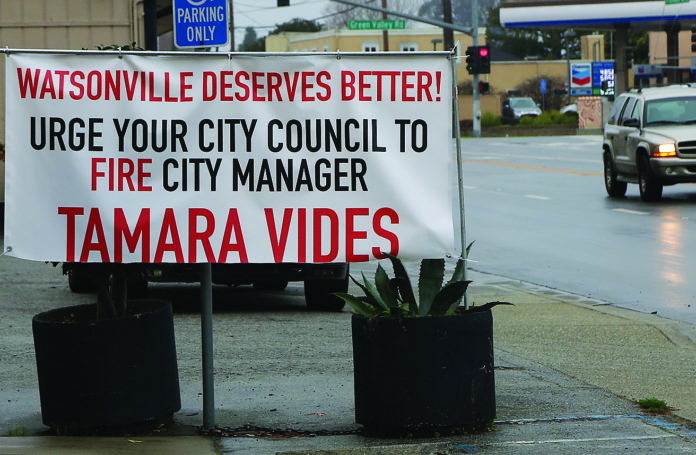
People driving through Watsonville recently may have noticed a handful of signs throughout the city, which call for the recall or firing of City Manager Tamara Vides.
The signs were put up by real estate developer Raeid Farhat, who says he believes Vides is an ineffectual leader. He says his intention in placing the signs was merely to bring attention to that.
And while the city manager is appointed by the city council and cannot therefore be recalled, he hopes to drum up interest in replacing city council members when four seats come up for reelection next year. Those members, he says, may be more inclined to fire her.
Farhat says that Watsonville residents are frustrated with homelessness, dirty streets and a lack of economic development, among other things.
“The only way this is going to get better is with a leadership change,” he says.
But Vides says that Farhat’s campaign started almost immediately after the city told him her would have to pay all the impact fees that were stipulated in his contract for the 49-unit development project at 221 Airport Blvd. over non-payment of impact fees.
In a press release, the city says that the city was requiring Farhat to pay nearly $1 million in impact fees before tenants would be allowed to move in.
“The developer has demanded that the City allow temporary or partial occupancy prior to him paying all of his fees, as is required by the contract,” the press release says. “As of the date of this press release, the developer has not requested a final inspection to obtain occupancy for the units, which must occur before the outstanding project fees are due.”
Impact fees are one-time charges to developers that are used to fund infrastructure improvements, public safety initiatives and community programs.
Farhat says that he has been able to pay fees for units when they were ready for occupancy in past developments.
This time, however, when he went to pay fees for water meters and impact fees—more than $85,000—for 32 units that were ready and receive Temporary Certificates of Occupancy, the city demanded fees to be paid for all 49 units before any permits were issued—more than $1.19 million.
“We’ve never asked for anything that hasn’t been given in the past,” he said. “I’ve been developing in this town for 25 years, and we’ve always paid our bills.”
Vides, however, says that one of those past developments—a 16-unit project on Marin Street behind the Target shopping center—resulted in litigation.
That project was completed in 2020.
“The city had to sue him to collect the fees,” she said. “The city prevailed, but we spent several thousands of dollars collecting what we were entitled to collect.”
Farhat says that the question of the fees is now moot, since he plans to pay all of them in full, and that he expects tenants to move in starting in March.
“I have never told the City Manager, her staff, or anyone else that I do not intend to pay the required impact fees,” he says. “I have never asked for a discount or requested that any fees be waived. I fully understand the purpose of these fees, the rationale behind them, and their importance to the City’s operations and infrastructure.”
That, Vides says, is part of the agreement with the city.
“He has a contract that very clearly states that his developer fees—impact fees—for the city are payable at the time of occupancy in full,” she says. “And that’s something he has been disputing.”











Farhat is a good man and the city’s requirement to pay all fees before units are completed or even ready to be occupied is nuts. I agree with him.
Here is another question. Why does Watsonville have so many Starbucks. One in Target store, one in Safeway, One on Main, One on Riverside Rd, and now another one will be built on Freedom Blvd. How much does the city get in kickbacks for approving so many union busting Starbucks? They over charge for their product and oppose union membership for their employees.
I forgot to add the other Starbucks at Freedom Center shopping center. That makes 6 Starbucks. Why not allow another coffee company to come in and start business. I do wonder how much $ City of Watsonville gets in kickbacks from Starbucks and why?
If you’re willing to open a different coffee shop apply for permits and build it
That’s not how property development works. A city doesnt go out to prospective tenants and say “please, come and build here” – it’s an applicant (Starbucks) that has the money and desire to open in a location that goes and applies.
WE DO NOT NEED ANOTHER STARBUCKS. and too many real estate developers are like donnie trump, who exploit others for their own greed. do we need that in Watsonville? NO.
Very true. I still wonder how much money the city gets for allowing a union buster like Starbucks to over build in Watsonville?
Property development and local goverment doesnt work that way. A parcel is available for sale or owned, they propose a development and its voted on based on zoning and whether it fits with the general plan goals of the city. There’s incentive to allow any and all businesses to build and operate because they get tax dollars. The reason there’s so many starbucks is because they’re the biggest in the world and have the capital to purchase land and open more locations.
Well it’s interesting Stevie me boy
Fact is President Donald J Trump is the (say his name with Love) President of the United States Commander in Chief, you will hail to the Chief
Full Stop, talk to the hand bro
Hahahahahahahahaha
So tell us Steve! What wackado idea do you suggest?
This has nothing to do with TRUMP, It is our city management look around Mc Donald’s, Burger King, star Bucks all are own buy people in Watsonville.
Why should the City give Farhat a pass on his fees when he proved that he wouldn’t pay them with Marin Street? The only thing he cares about is his own profit. The fees he is required to pay help with infrastructure improvements that he’s complaining about.
The only thing he cares about is his profit? THIS IS A LIE! Raeid works 24/7 for his clients and his family. Mr. Farhat helped me buy the perfect home for the best deal. For you to say this on a news platform makes you a person of very low character.
BTW Is anyone reading this?? $1 million in impact fees??? This should be CRIMINAL!
Infrastructure Improvements? We pay (at least I do) 40% of our money to taxes. Why does Raeid have to pay for it? Because all our tax money is gone! USAID does not only show us federal corruption it shows how “our leaders” do it in all government, including Watsonville.
Correlating USAID to fees to maintain basic infrastructure – Talk about moving the goal posts. Impact fees pay for increased services due to more people living in the city. That means more people are using streets, schools, water, electricity, fire and police services, etc. If you allow unfetter development and pass the developers fees to us – they get insane profits and dont have to deal with the impact to the people that live here. Yes its a deterrent, but even so, once they pay these fees, they still have insane profits. They want 3 Teslas in the driveway, not just one – so cmon watsonville, be chill mannnn and let them pillage our community
The city lets a HOA development contractor build and the new tenants move in when the house is completed. They keep building as they are sold, I live in a HOA and the city made the contractor put in our cc&r’s that we had to take care of a retention pond that is not used by the HOA and put a purchased option to repurchase our common area of the HOA for $10.00 we are responsible for all maintenance
For 21 years. At a cost of $9,000 a year. The city planning, the city Manager would not even talk to use
And our city council person could care less about are district #7
Impact fees are the way the city gets developers to pay for the things that the city should have been paying for all along.
The City should have been paying for? Where do you think the city gets funds?! It’s us who pays – so you’re saying developers can come in and plop a 10 story development on every block and tell us to worry about parking, infrastructure, school impacts, etc? Thats cute.
Wrong
Tired of millionaires trying to bend the rules and strong arm others to get their way. Regardless of all other issues Watsonville faces, the terms of the issue at hand were clearly stipulated in the contract. Shouldn’t have signed if he wasn’t willing to pay in full.
JG you do realize that all fees (really taxes) have to be paid by the consumer. So do not complain about the high cost of living. The high rental and housing prices. The homeless situation. etc. or the slum Watsonville has become. The “fees” that drive up the costs of living go to “pork belly progressive” programs not “vital interests” like homelessness, police, fire, maintaining flood control etc. Scapegoating the millionaires for all the problems is just plain ignorance,,,,
Now we have to see these big angry signs all over town because one person can hijack our community streets…we all live here, not just an unhappy, disgruntled developer. Pay your fees and get on with your good life. So many people would trade places…people with no homes, no insurance, no jobs, no investments…
❤️👍🏼
Exactly Right!
Look what Watsonville pays in salary’s city manager $27,000 per month plus we pay for retirement.
BLOW ME !!!!!
A KISS 💋
After living in Los Angeles for most of my life I have learned to be skeptical of any developer. Their interest is always to develop open land not for the benefit of the community, but the benefit of their bottom line. Admittedly I do not know this man and he may have good intentions, but I still remain skeptical.
You signed the contract and were aware of the terms….are you now surprised?
Allow the homes to be rented out instead of leaving them empty, especially considering the current atmosphere of housing shortages. If the developer didn’t pay his bills in the past developments I would understand the concern but that isn’t the issue . Let him rent out the units and earn a return so he can pay the impact fees . Problem solved!
Just a bunch of haters working for the city of Watsonville. Don’t hate congratulate instead!
Or maybe , he could pay his bills on time.